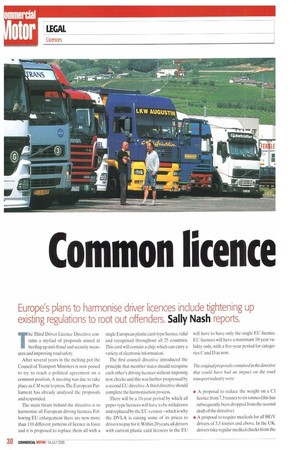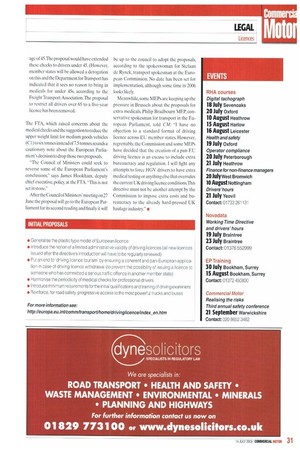Common licence
Page 30

Page 31

If you've noticed an error in this article please click here to report it so we can fix it.
Europe's plans to harmonise driver licences include tightening up existing regulations to root out offenders. Sally Nash reports.
The Third Driver Licence Directive contains a myriad of proposals aimed at beefing up anti-fraud and security measures and improving road safety.
After several years in the melting pot the Council of Transport Ministers is now poised to try to reach a political agreement on a common position. A meeting was due to take place as CM went to press.The European Parliament has already analysed the proposals and responded.
The main thrust behind the directive is to harmonise all European driving licences. Following EU enlargement there are now more than 110 different patterns of licence in force and it is proposed to replace them all with a single European plastic card-type licence, valid and recognised throughout all 25 countries. This card will contain a chip. which can carry a variety of electronic information.
The first council directive introduced the principle that member states should recognise each other's driving licences without imposing new checks and this was further progressed by a second EU directive. A third directive should complete the harmonisation process.
There will be a 10-year period by which all paper-type licences will have to be withdrawn and replaced by the EU version— which is why the DVLA is raising some of its prices to drivers to pay for it.Within 20 years, all drivers with current plastic card licences in the EU will have to have only the single EU licence. EU licences will have a maximum 10-year validity only, with a five-year period for categories C and D as now.
The on proposals contained in the directive that could have had an impact on the road transport industry were: • A proposal to reduce the weight on a Cl licence from 7.5 tonnes to six tonnes (this has subsequently been dropped from the second draft of the directive) • A proposal to require medicals for all HGV drivers of 3.5 tonnes and above. In the UK, drivers take regular medical checks from the age of 45.The proposal would have extended these checks to drivers under 45. (However, member states will be allowed a derogation on this and the Department for Transport has indicated that it sees no reason to bring in medicals for under 45s, according to the Freight Transport Association. The proposal to restrict all drivers over 65 to a five-year licence has been removed.
The FTA, which raised concerns about the medical checks and the suggestion to reduce the upper weight limit for medium goods vehicles (Cl) to six tonnes instead of 7.5 tonnes,sounds a cautionary note about the European Parliament's decision to drop those two proposals.
"The Council of Ministers could seek to reverse some of the European Parliament's conclusions," says James Hookham, deputy chief executive, policy, al the ETA. "This is not set in stone."
After the Council of Ministers' meeting on 27 June the proposal will go to the European Parliament for its second reading and finally it will be up to the council to adopt the proposals. according to the spokeswoman for Stefaan de Rynck, transport spokesman at the European Commission. No date has been set for implementation, although some time in 2006 looks likely.
Meanwhile, some MEPs are keeping up the pressure in Brussels about the proposals for extra medicals. Philip Bradbourn MEP, conservative spokesman for transport in the European Parliament, told CM: "I have no objection to a standard format of driving licence across Eli member states. However, regrettably, the Commission and some MEPs have decided that the creation of a pan-Ft driving licence is an excuse to include extra bureaucracy and regulation. I will fight any attempts to force HGV drivers to have extra medical testing or anything else that overrules the current UK driving licence conditions. This directive must not be another attempt by the Commission to impose extra costs and bureaucracy to the already hard-pressed UK haulage industry." •










































































































































































































